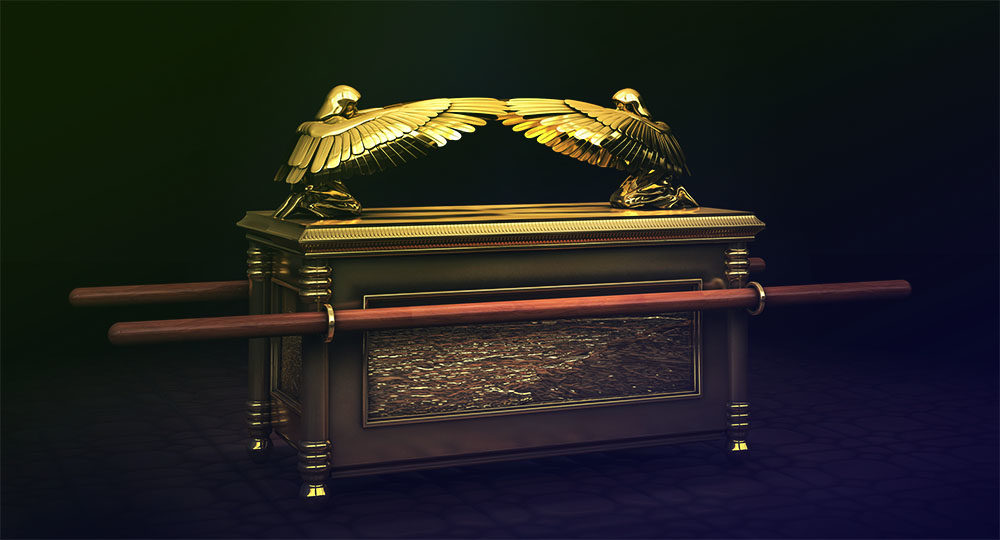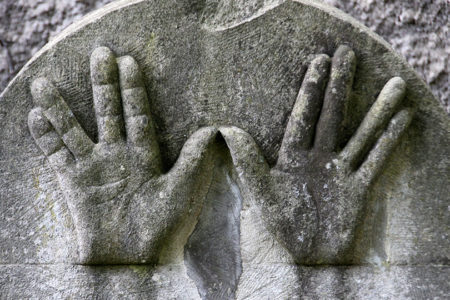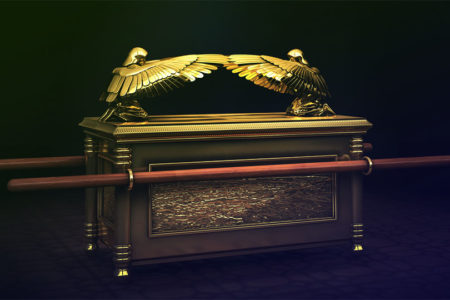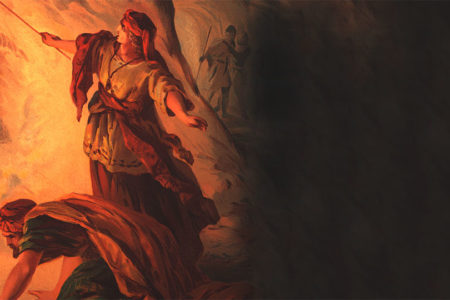The Gold-Box Idol
The Ark of the Covenant was extremely important to the people of Israel—but not always for the right reason.
During the closing period of the judges, the Israelites embraced wicked beliefs in their worship and view of God. God had confirmed Samuel as His spokesman and true prophet, but the Israelites refused to obey. Instead, they trusted in the Ark of the Covenant, thinking that doing so was the same as having a heart relationship with God. They soon discovered they were wrong.
THE STONES CRY OUT
You can read more of what archaeology has revealed about the Ark in The Stones Cry Out by Randall Price.
The Ark was a rectangular box of acacia wood overlaid with gold. It had a gold lid, or “mercy seat,” with two gold cherubim with outspread wings. Inside were stone tablets inscribed with the Ten Commandments.
Exodus 25:22 describes the special purpose it served: “And there I will meet with you, and I will speak with you from above the mercy seat, from between the two cherubim which are on the ark of the Testimony, about everything which I will give you in commandment to the children of Israel.” The Ark served as the only place believing Israelites could go (through the high priest) to atone for their sins.
Israel’s Foolishness
In Samuel’s day, the Israelite armies mobilized to fight the Philistines, who had moved inland from the coast and established five cities: Gaza, Ashkelon, Ashdod, Gath, and Ekron (Josh. 13:3).
The Philistines were a constant thorn in Israel’s side. They worshiped a disgusting idol called Dagon, whom they had designed as half-man and half-fish. It was as if they wanted to promote the belief that both men and fish had evolved together.
The Israelite-Philistine clash resulted in the death of 4,000 Israelite soldiers (1 Sam. 4:2). Israel’s elders wondered why the Lord had allowed such a catastrophe, but they never considered the fact that they were the problem.
In an attempt to defeat the Philistines, the elders presented a new proposal: “Let us bring the ark of the covenant of the LORD from Shiloh to us, that when it comes among us it may save us from the hand of our enemies” (v. 3). They foolishly decided to put their trust in the Ark, rather than in God. Proverbs 19:3 says, “The foolishness of a man twists his way, and his heart frets against the LORD.” The Israelites demonstrated extreme foolishness, and their way was twisted indeed.
The Israelites brought the Ark to the battle lines for a second assault against the Philistines. When it arrived near the Philistine encampment at Aphek, the Israelites shouted for joy; but the Philistines panicked (1 Sam. 4:5–7). The Philistines knew of Israel’s fearsome God (vv. 7–8). Yet they rallied and fought hard anyway, killing 30,000 Israelite soldiers, including Eli’s evil sons, Hophni and Phinehas. The remaining Israelites retreated to their tents in disgrace, while the Philistines marched back to their camp with their grand trophy—the Ark of the Covenant (vv. 10–11).
God’s Retribution
The Israelites were disillusioned. Surely, they thought, the Ark should have brought success. After all, didn’t it help them conquer Jericho?
In the Jericho campaign, the Ark did play an important role in their victory (Josh. 6:2–20); but the difference was they had trusted in the Lord, not in the Ark. The Israelites should have remembered Joshua’s challenge before his death: “Now therefore, fear the LORD, serve Him in sincerity and in truth, and put away the gods which your fathers served on the other side of the River and in Egypt. Serve the LORD!” (24:14).
Losing the Ark signaled God’s displeasure with His people’s sin. When Eli, the elderly high priest, heard of the Ark’s fate, he fell backward off his chair, broke his neck, and died (1 Sam. 4:18). Some people say his heart broke first.
When Eli’s pregnant daughter-in-law heard the Ark had been captured and her husband and father-in-law were dead, she went into labor. Before she died, she named her newborn son Ichabod, saying, “The glory has departed from Israel, for the ark of God has been captured” (v. 22).
After their victory, the Philistines placed the Ark in the temple of Dagon. They soon learned Dagon was no match for Yahweh. The next morning they discovered the statue of Dagon had fallen on its face before the Ark. They set it back up, and the next morning they again found it on the ground, this time in pieces. Dagon’s head and hands were broken off. Only the torso remained (5:2–4).
Then God struck the city of Ashdod with what appears to have been the bubonic plague. Frightened, the Philistines decided to move the Ark to Gath. Then God struck Gath. So they moved it to Ekron. Then God struck Ekron (vv. 6–10).
These calamities forced the Philistines to acknowledge the sovereignty and power of Israel’s God. However, they still chose to resist and hold on to their pathetic idol.
Sadly, many people today are no different. They acknowledge the uniqueness of Jesus Christ, but they remain unmoved in accepting Him into their lives. Second Corinthians 4:4 says, “The god of this age [Satan] has blinded [the minds of those], who do not believe, lest the light of the gospel of the glory of Christ, who is the image of God, should shine on them.”
Spiritual blindness afflicts people in all nations, cultures, and walks of life and makes them clutch their false gods and idols, rather than turn to Jesus.
Return of the Ark
After possessing the Ark for seven months, the Philistines decided they had better return it. They put it on a cart hitched to two milk cows that had never been yoked and sent it away, watching to see where it went. It went straight to the Levitical town of Beth Shemesh (1 Sam. 6:2–12).
When the Levites saw the Ark, they took it down. However, all was still not well. God struck down 50,070 men of Beth Shemesh for daring to look inside the Ark (v. 19)—more men than had died battling the Philistines.
God tolerates no transgressions: “For all…who behave unrighteously, are an abomination to the LORD your God” (Dt. 25:16). From Beth Shemesh the Ark was transported to Kirjath Jearim, where it remained for 20 years (1 Sam. 7:1–2).
After the Ark’s retrieval, Samuel told the people of Israel, “If you return to the LORD with all your hearts, then put away the foreign gods and the Ashtoreths from among you, and prepare your hearts for the LORD, and serve Him only; and He will deliver you from the hand of the Philistines” (v. 3). So the people fasted and repented of their idolatry. Samuel interceded for them before the Lord, and God delivered them from the Philistines (vv. 4–14).
The Israelites needed to understand that the Ark itself had no power. Power came only from the God who chose to dwell there, between the cherubim.
More than a thousand years later, God would dwell with Israel again in the person of Jesus Christ. As the Jewish apostle John wrote, “And the Word became flesh and dwelt among us, and we beheld His glory, the glory as of the only begotten of the Father, full of grace and truth” (Jn. 1:14). Someday He will come again and dwell with us forever.
Meanwhile, we are to place our faith in the Son of God and worship Him in spirit and truth—and not trust in anyone or anything else (Ps. 2:12).








About a year ago the Lord gave me this song about the woman with the issue of blood.(I was in kidney failure at the time but had received a transplant which several miracles occurred connected with this transplant.) The song goes like this . She heard the voice of her savior, she saw the plan of God she saw his Holy sacrifice on she saw the lamb of God,so she touched the wings of his garment, she touched the cheribims,she touched the ark of the covenant, oh she touched the lamb of God. The word hidden that you refer to & your explanation of what you believe Paul could have meant I saw in this song . She saw God’s hidden messiah. Glory!
Our family loves your articles and insights. Please return back to winona lake conference soon!
God bless
Thank you for this article.
From a child I was fascinated with the Tabernacle and especially the Ark! Years later I was reading Colossians 3:3 and wondered about the word “hidden” and the Ark came to mind. I know the Messiah is the Word, the Resurrection & Life, and the Bread of Life and again I thought of the Tablets, the Rod that budded and the Manna and then pictured myself with Messiah in (hidden) the Ark (in God). I’ve always wondered if that is what Paul was thinking about when he wrote this verse. I even thought of the Holy Place as Spirit (Menorah) & Truth (the Word=Table of Showbread) which is needed to put self on the Altar in Incense (dying to self), before entering into God’s presence and hearing His Voice!